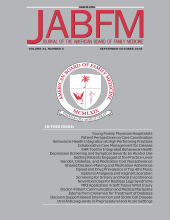To the Editor: I read with interest Dr. Frey's comments spurred by my recent article1 on differences between preparation for and provision of different clinical activities seemingly central to the core of family medicine. Like many people, my refrigerator door has many magnets, among my favorites is one the American Academy of Family Physicians sent me that says, “PROUD FAMILY DOC.” Lately I have been wondering what it means to be a proud family physician. Our specialty still holds the archetype of the proud family physician as one who is long standing in their community, provides cradle-to-grave care, and will care for their patients when and where they need them. This phenotype is becoming the rare exception to a growing list of “-ists” who care for one part of a patient or only care for them in limited settings.
Should I be proud of my broad-scope training if I do not use it? Should I be proud of the care I provide my patients even if I no longer provide inpatient care, deliver babies, and rarely see children in the office? Should I be proud of my mindset and values? Should I be proud of the history of our specialty when the present may not honor it?
The core of what a family physician is, seems under question. Dr. Frey suggests that family physicians rally together to take down health care systems or create their own. Such collective actions require a sense of community and common purpose that seems to be rapidly declining among family physicians. In my day job at the American Board of Family Medicine, we are challenged by family physicians insisting their board certification be tailored to “what I do” instead of certification representing that they have specialized training and knowledge and skills in the breadth of the specialty. If allowed, where would this logical slippery slope stop? Would we fix the reported difference between preparation and practice by tailoring residency requirements so obstetric training, care of children, or gynecology become optional? What message are we sending to the public when family physicians are not taking care of the family and what are we saying to ourselves about who we are and what we value with our collective shrinking of our scope of practice?
As Dr. Frey writes, solidarity is power. With evidence that broad-scope care is associated with lower costs, fewer hospitalizations,2 and lower rates of burnout,3 one would expect the public, payers, health care systems, and importantly us to call for family physicians to practice to the extent of their training. And to keep that training broad. I hope we can transform care systems for the betterment of ourselves and our patients. Then I will be truly proud.
Notes
To see this article online, please go to: http://jabfm.org/content/31/5/830.full.
The above letter was referred to the author of the article in question, who offers the following reply.







